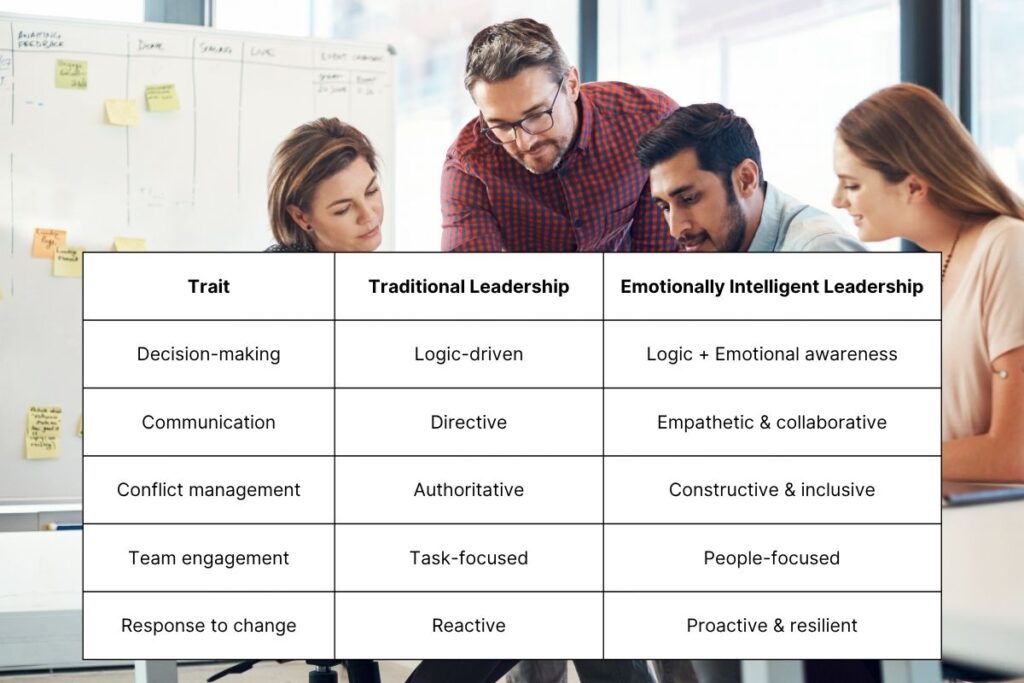In today’s rapidly changing, hyper-connected, and emotionally complex business landscape, leaders are no longer judged solely by their strategic acumen or decision-making skills. Increasingly, a different kind of intelligence, emotional intelligence (EI), is shaping the most effective and inspiring leaders of the modern era. Emotional intelligence is not just a “soft skill” anymore; it’s a core competency that determines whether a leader thrives or merely survives.
This blog explores why emotional intelligence in leadership is a true competitive edge, how it impacts organizational success, and how leaders can cultivate it to enhance their effectiveness, relationships, and results.
What Is Emotional Intelligence?
Emotional Intelligence refers to the ability to recognize, understand, manage, and influence emotions, both one’s own and those of others. Psychologist Daniel Goleman, who popularized the concept, identified five key components of emotional intelligence:
- Self-awareness
- Self-regulation
- Motivation
- Empathy
- Social skills

While IQ and technical skills remain foundational, research consistently shows that emotional intelligence accounts for nearly 90% of the difference between high performers and their peers in leadership roles.
The Emotional Intelligence in Leadership
1. Enhanced Communication and Collaboration
Leaders with high emotional intelligence are exceptional communicators. They actively listen, understand non-verbal cues, and tailor their message for different audiences. This creates an environment of openness and trust, enabling teams to communicate more freely, avoid misunderstandings, and collaborate effectively.
Example: A CEO navigating a company-wide restructuring who listens empathetically to employee concerns and communicates transparently is more likely to maintain morale and prevent disengagement.
2. Increased Employee Engagement and Retention
Employees want to feel valued, heard, and respected. Emotionally intelligent leaders understand the emotional needs of their team members, offer support when needed, and recognize achievements meaningfully. This fosters a positive workplace culture and leads to higher employee engagement, satisfaction, and retention.
Statistics: According to a Gallup study, teams led by emotionally intelligent managers are 59% less likely to have high turnover, and more than twice as likely to be engaged at work.
3. Stronger Conflict Resolution Skills
Workplace conflicts are inevitable. However, leaders with high EI can approach conflict calmly, fairly, and objectively. They are skilled in understanding all sides of an issue, identifying emotional triggers, and facilitating resolution without escalation.
Instead of reacting impulsively, emotionally intelligent leaders respond thoughtfully, ensuring long-term harmony and maintaining professional relationships.
4. Resilience During Crisis and Change
Change is constant in today’s business environment. Whether it’s economic downturns, mergers, or technological disruptions, emotionally intelligent leaders remain composed under pressure, help their teams cope with uncertainty, and drive performance even during turbulence.
Leadership Example: During the COVID-19 pandemic, leaders with strong emotional intelligence demonstrated empathy, offered flexibility, and prioritized mental wellness, setting their organizations apart in crisis response.
5. Improved Decision-Making
While decisions should be grounded in data and logic, emotions still influence the process. Self-aware leaders recognize emotional biases and manage them proactively. They consider the human impact of their decisions and weigh emotional data alongside hard metrics.
This holistic decision-making approach leads to better outcomes and stronger stakeholder buy-in.
Emotional Intelligence vs. Traditional Leadership
Traditional leadership often emphasized authority, assertiveness, and decisiveness. While these traits are still valuable, they are no longer sufficient in isolation. Today’s most admired leaders, Satya Nadella (Microsoft), Jacinda Ardern (Former New Zealand PM), Oprah Winfrey, have succeeded not just through competence but by connecting emotionally with people.
Here’s a quick comparison:

| Trait | Traditional Leadership | Emotionally Intelligent Leadership |
| Decision-making | Logic-driven | Logic + Emotional awareness |
| Communication | Directive | Empathetic & collaborative |
| Conflict management | Authoritative | Constructive & inclusive |
| Team engagement | Task-focused | People-focused |
| Response to change | Reactive | Proactive & resilient |
How to Cultivate Emotional Intelligence in Leadership
Unlike IQ, emotional intelligence can be developed and strengthened over time through conscious effort and feedback.
1. Develop Self-Awareness
- Reflect on emotional triggers.
- Maintain a journal of thoughts and reactions.
- Seek feedback from peers or mentors.
- Practice mindfulness to stay grounded.
2. Improve Self-Regulation
- Learn to pause before responding in heated moments.
- Use stress-reduction techniques like deep breathing or exercise.
- Cultivate patience and avoid reactive behavior.
3. Stay Motivated with Purpose
- Align personal values with leadership goals.
- Set achievable, meaningful objectives.
- Celebrate progress and milestones.
4. Practice Empathy
- Listen more than you speak.
- Consider perspectives outside your own.
- Offer support without judgment.
5. Enhance Social Skills
- Network genuinely, not transactionally.
- Provide constructive feedback with care.
- Mediate conflicts with diplomacy and fairness.
The Business Case for Emotional Intelligence
Organizations led by emotionally intelligent leaders outperform others in key metrics:
- Better financial performance: Companies with high EI leadership show better stock performance and profitability due to high employee performance and engagement.
- Stronger culture: EI fosters psychologically safe, inclusive, and innovative environments.
- Brand reputation: Empathy and authenticity in leadership resonate externally with customers and stakeholders.

Case in Point: Satya Nadella’s transformation of Microsoft was rooted in fostering a growth mindset culture. His emotionally intelligent leadership helped revive Microsoft’s internal culture, improve collaboration, and increase innovation, ultimately leading to record-breaking financial growth.
Emotional Intelligence and the Future of Leadership
As artificial intelligence and automation become more prevalent, human-centered leadership will be more important than ever. Emotional intelligence represents a uniquely human advantage that machines can’t replicate.
In the future of work, leaders will need to:
- Navigate hybrid teams with emotional nuance.
- Address diversity and inclusion with sensitivity.
- Lead across cultures and generations with empathy.
- Mentor and inspire with emotional resonance.
In this context, emotional intelligence is not only a competitive edge, but it is the foundation of future-ready leadership.
Conclusion: The Heart of Effective Leadership
Emotional intelligence is not a luxury or a soft add-on to leadership; it is the heart of effective, sustainable leadership. Leaders who cultivate emotional intelligence create healthier organizations, happier employees, and higher-performing teams.
As businesses evolve, those who lead with empathy, self-awareness, and emotional insight will not only rise above the rest, but they’ll redefine what success looks like in the modern era.
So, whether you’re a startup founder, a corporate executive, or an aspiring team leader, investing in emotional intelligence is one of the most strategic leadership decisions you can make.
Final Thought:
“People will forget what you said, people will forget what you did, but people will never forget how you made them feel.” – Maya Angelou
And that is the essence of emotionally intelligent leadership.

